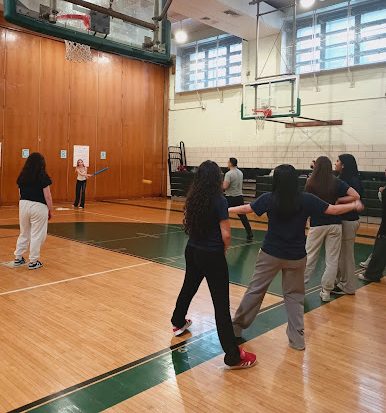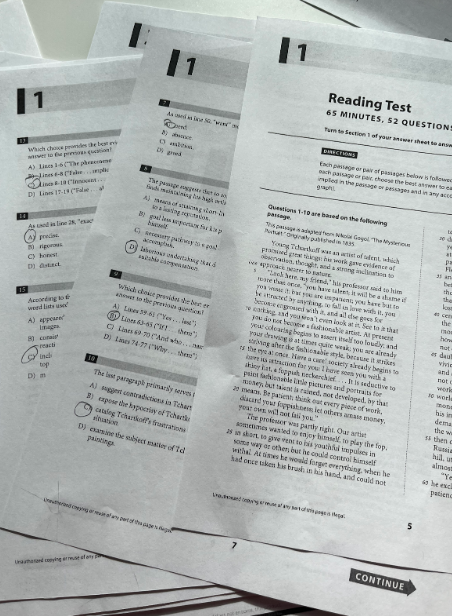Settling for Standardized Tests: There May be More Pros Than You Think
May 2, 2023
As we are approaching the end of the year, juniors, seniors, and even some sophomores have many stressful exams coming up right around the corner, specifically the SATs and ACTs. Freshmen were in middle school just 10 months ago, during which they had to experience the highschool admissions process. At the end of the year, each grade has their fair share of APs and regents. But are all of these standardized tests really efficient, or do the negatives outweigh the positives?
Although there are numerous debates regarding this topic as these tests can be discriminatory, the health aspect such as the amount of stress, depression, anxiety, lack of sleep, etc, is often overlooked.
Regardless of the negative aspects of standardized testing, it is important to acknowledge that it is the best solution to assess a student’s knowledge that the schooling system has for the moment. Yuliana Rossi, a junior at the NYC Museum School believes that “it’s necessary to make sure the teachers are keeping up with the course, but I don’t think it’s fair for the Department of Education to take it out on the teachers if they don’t meet the requirements.”
Teachers have to prepare their students for the test, but as we get older, self-studying becomes more important, meaning that students can not rely entirely on in-class lessons to be able to ace the exam. This applies especially to more rigorous courses like an AP or honors classes. Students do need to keep up on their own, and teachers cannot entirely be blamed for the failure of certain students.
Additionally, standardized tests are often used for college admissions, so they can better filter out the ideal candidates. Despite there being some students who struggle with test taking, it is still a measure of a student’s efforts and oftentimes, their academic intelligence.
Ms. Schliessmann, Algebra 1 and Pre-Calculus teacher at NYC Museum School, said, “Having something like a regents exam for New York, helps schools know what the students know. SAT wise, for the country, it helps see what the students know for colleges to see.” There does need to be a ‘constant’ throughout the country that truly demonstrates a student’s ability so that there is at least one measurement that cannot involve any bias on the grading part.
Grades are also heavily weighed during the college admissions process, and many students (and teachers) at Museum School will tell you that they are much easier to keep up than test scores. “Grades you can kind of ‘cheat your way out of’, but tests you actually have to know all the information.” said Tenzin Dakar, a senior at Museum School.
During exams or tests, you have to balance the time limit, the difficulty of the questions, and the struggle of sitting still for a long period of time. When completing your homework, you can receive assistance, and take as much time as you need. When you take a test in class, there are often test corrections or even test retakes. Many opportunities to increase grades are given which is why sometimes GPAs are not always an accurate representation of a student’s academic achievements.
Additionally, some teachers are more lenient, which can result in higher grades in a classes, even if you don’t particularly do better in said class, “In this school, we are supposed to be preparing students for the real world or college, so some of the policies of retaking the tests, or not giving zeros, we’re helping them because we don’t want them to fail. But I always wonder if we end up hurting them because that probably won’t happen in college.” said Ms. Schliessmann. A standardized exam doesn’t offer all of these policies that can prevent failing grades. Therefore, standardized tests are more fair when it comes to the grading system of them.
That being said, there are many disadvantages or advantages, depending on one’s background, that can enhance or diminish one’s score on these exams. A major issue that comes to mind is tutoring, and how some people can afford it, whereas others cannot. According to the College Board, “as little as 6-8 hours of personalized SAT prep can lead to an average score increase of 90 points on the test. 20 hours of SAT prep led to even more substantial score improvement, with an average score increase of 115 points”.
It is also important to consider the toll that these tests take on your mental health. When aiming for high scores, students will spend exhaustive amounts of time preparing, “Last year, I spent my entire spring break studying for the AP exam and training myself to actually physically take the test, and teaching myself the curriculum. For SATs too…, so it really takes a toll on your mental health.” says Mia Kitaeff, a junior at Museum School. This can create unhealthy sleeping schedules, depression, and stress.
During tests themselves, students often struggle with time management, which can trigger anxious feelings, hindering someone’s ability to perform well on an exam. Sometimes there are essays or questions that a student may not know the answer to, which tends to increase stress. Some students may even cry during a test when they realize they may not do well despite the amount of time that they have studied.
After the test, when results are out, students tend to discuss and compare their scores. This can create a negative environment, as those who received lower scores may feel as if they aren’t smart enough, despite sometimes studying for hours.
Overall, there is generally a correlation between intelligence or studying and the exam scores which can aid colleges in choosing their candidates. However these results require immense and unhealthy amounts of studying. There is also not always a correlation, some people are not good test takers despite being intelligent, and some people have access to tutoring which can greatly aid in acquiring higher scores. Finding a more adequate form of measuring a student’s intelligence would be preferable, but for the moment, standardized testing has to remain an important part of a student’s school life.




























